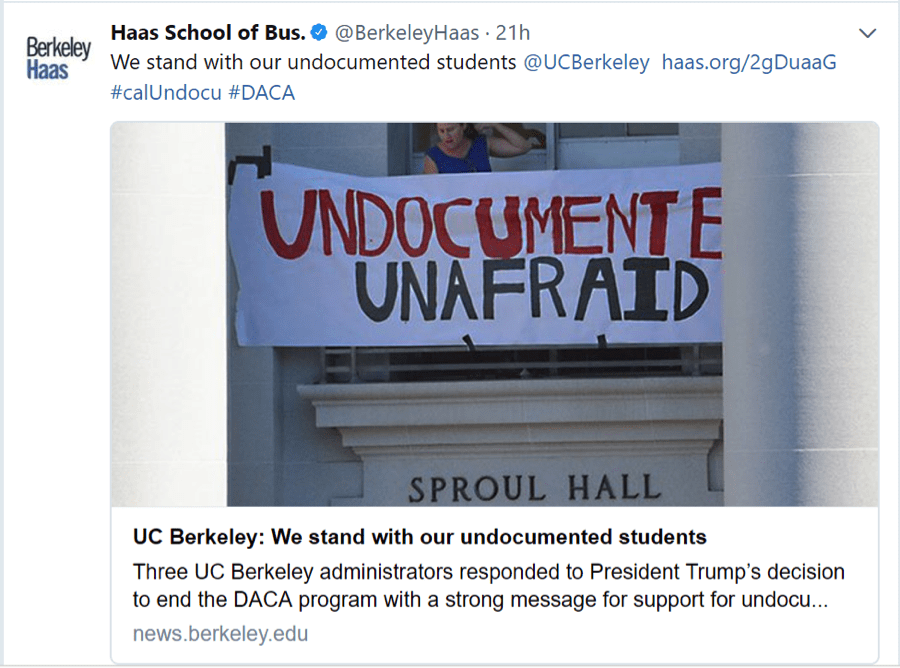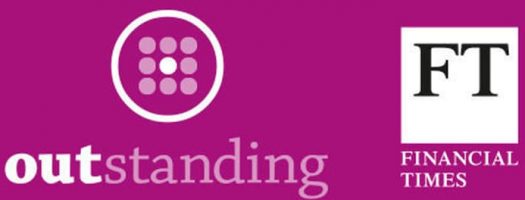Business, University Leaders Speak Out Against DACA Repeal

When the Trump administration formally announced yesterday that it would end the Deferred Action for Childhood Arrivals program (DACA)—putting a six-month expiration date on legal protections granted to approximately 800,000 people who entered the U.S. illegally as children—universities and business leaders were quick to condemn it. Indeed, vocal defense of the “Dreamers,” as those in the DACA program are called, resounded from Silicon Valley to the Ivy League.
“Dreamers contribute to our companies and our communities just as much as you and I,” tweeted Tim Cook, CEO of Apple and an MBA graduate of Emory’s Goizueta Business School. “Apple will fight for them to be treated as equals.” In an earlier statement Cook noted that Apple employs hundreds of people covered by DACA.
Facebook CEO Mark Zuckerberg released his own statement on his personal Facebook page. “This is a sad day for our country,” he wrote. “The decision to end DACA is not just wrong. It is particularly cruel to offer young people the American Dream, encourage them to come out of the shadows and trust our government, and then punish them for it.” He added that the young people covered by DACA contribute to their communities and to the economy. “I’ve gotten to know some Dreamers over the past few years, and I’ve always been impressed by their strength and sense of purpose. They don’t deserve to live in fear.”
DACA was enacted in 2012 under former President Barack Obama by executive order, allowing individuals who were brought to the United States as children or teens before mid-2007 to apply for protection from deportation and work permits. To apply, they had to be younger than 31 at the time the program was created, have come to the U.S. before turning 16, and have lived in the U.S. for at least five years. The U.S. Citizenship and Immigration Services reports that roughly 788,000 have had their requests for DACA status accepted.
University and Business School Leaders Denounce DACA Repeal
A Center for American Progress survey of roughly 3,000 DACA recipients found that approximately 72 percent of respondents were in higher education, 13 percent of those pursuing master’s degrees. And leaders in higher education—including at several leading business schools—were every bit as vocal as major business leaders in calling out the Trump administration’s decision and pledging their support to Dreamers.
Geoffrey Garrett, dean of the University of Pennsylvania’s Wharton School, called the repeal of DACA “bad for the economy and bad for society” in a tweet that also expressed his support for an official statement issued earlier in the day by University of Pennsylvania President Amy Gutman.

Maryellen Reilly, Wharton Deputy Vice Dean for Admissions, financial aid and career management, quoted from Gutman’s statement in her own tweet: “At Penn, we are committed to providing a safe and welcoming environment for all of our students and we will do everything we can…”

Columbia University, home to Columbia Business School (CBS), issued its own statement in opposition to the repeal of DACA. “Columbia unequivocally opposes the ending of DACA and is working with others in higher education to urge Congress and federal officials to reinstate DACA’s protections and protect the rights of those with DACA status during and after the ‘wind-down’ process that has been announced,” it read. It went on to add that in keeping with Provost John Henry Coatsworth’s November pledge, “our policies and plans aim to ensure that students who had DACA coverage are able to proceed unimpeded with their studies and that all students in the community feel safe and understand beyond question that Columbia’s dedication to inclusion and diversity, including of undocumented students, is and will remain unwavering.” CBS quickly retweeted its parent university’s stance and linked to the full statement.
And the Haas School of Business at the University of California at Berkeley tweeted: “We stand with our undocumented students.” That tweet linked to a statement issued by three ranking university administrators—Chancellor Carol Christ, Vice Chancellor for Equity & Inclusion Oscar, and Undocumented Student Program Director Meng So—that called on the Berkeley community to stand with undocumented scholars at the university and beyond.

“At a time when our campus and community values are being challenged by the prevailing national rhetoric and policy making, we must deepen our resolve and commitment to our principles and to each other,” read the Berkeley administrators’ statement. “During these difficult moments, we must defend strongly held values of dignity, diversity and community.”
The Kelley School of Business at Indiana University at Bloomington, for its part, retweeted its parent university’s official statement and pledge to support all its students.

In the statement, IU President Michael A. McRobbie called out the decision to end DACA “especially in light of the administration’s prior statements expressing support for young people protected by DACA and the strong bipartisan support that exists nationwide for maintaining the program.”
McRobbie went on to underscore the university’s support of all its students. “We believe that all of our students, regardless of their background or country of origin, bring to our campuses unique perspectives and experiences that enrich our living and learning communities,” he wrote. “In doing so, they reflect who we are—and what we strive to be—as a university that provides all students with the opportunity to expand their knowledge and succeed in a place where they feel valued, respected and at home.”
In fact, IU features an entire website—DACA @ IU—dedicated to helping DACA students at the university. On the website, the university states that though bound by state and federal laws, it will take steps to support all IU students regardless of documentation and will only inquire into a person’s immigration status when required by law. IU also provides counseling and support to students who have immigration-related concerns, including connecting students with available resources for educational and living expenses.
Penn, Columbia, Berkeley, and IU are just a few of countless schools that spoke out against the Trump administration’s decision. Prior to the final decision to end DACA, 600 college and university presidents signed a statement promoting DACA back in November. Even more recently, Duke University’s President Vincent E. Price wrote a letter in support of the program, and University of Michigan President Mark Schlissel made a statement as part of the university’s September 1st convocation saying, “I would like to reiterate to all of our students, from our own state, elsewhere around the country, and from all around the world, that you are welcome here … You make us a stronger university and enrich our community and nation by your many talents, hard work, and the diverse perspectives and life experiences you bring to campus.”
As information continues to be provided by the Trump administration, many universities and schools are preparing to provide up-to-date information for their DACA students and all who are affected. Check in with your school for more information.
This article has been edited and republished with permissions from Clear Admit.
LBS MBA Student Named Future LGBT Leader By Financial Times

London Business School student Dr. Nicholas Deakin, ‘17 MBA, was among the honorees named to this year’s Financial Times “2016 OUTstanding LGBT + Future Leaders” list, coming in at an impressive fifth overall.
Dr. Deakin has already made a long-standing positive impact in the LGBT community as an acting co-president of the LBS Out In Business Club and volunteer member of the school’s Diversity Role Models program. He was one of three LBS alumni named to the “Future Leaders” list, alongside Samuel Rensing, ‘16 MBA, and Emmeline Tang ‘15 MBA. Elliot Vaughn, a ‘05 LBS graduate and current partner and managing director at the Boston Consulting Group, was named to the “Top 100 LGBT Executives” list as well.
“Diversity is part and parcel of life at London Business School, whether you look at the professional backgrounds, nationalities, genders or the sexuality of LBS students,” Deakin told LBS after earning the honor. “We are united by difference and represent the truly cosmopolitan nature of London.”
Co-leading the school’s Out In Business Club, Dr. Deakin helped land the school’s largest ever LGBT student intake in 2015.
“The Out in Business Club has developed into one of the most active clubs on campus, driven by corporate support from the school’s biggest recruiters and buy in from the very highest levels of the School including faculty,” he noted.
“We are tremendously grateful to LBS for providing the funding for our first ever LGBT+ scholarship candidate. Sitting between the school and the professional community, we connect our students with the most forward-thinking recruiters, current LGBT+ leaders and professional organisations who are demonstrating the return on diversity in business.”
The Financial Times’ methodology behind this year’s “Future Leaders” ranking weighed performance and potential, with a strong focus on LGBT inclusion. Those honored on both the “Future Leaders” and “Top 100 LGBT Executives” list were nominated by their peers explicitly with permission that they be published, hence why Apple CEO Tim Cook is curiously missing from the latter. Gigi Chao, executive vice-chairman, Cheuk Nang Holdings Ltd. led the “Top 100 LGBT Executives” ranking—the first time an Asian executive has earned the top honor.
This year’s “2016 OUTstanding LGBT + Future Leaders” list can be read here.
Top MBA Recruiters: Apple

Okay, let’s take a second to think about something: How many Apple products do you own? Macbook Pro, check; iPhone, check; Apple Watch, check; the list goes on and on.
Apple has created, produced and innovated such great products over the years that the company has really changed the face of the consumer electronics industry. The late Steve Jobs—a college dropout—gets a lot of the credit for Apple’s industry success, but there’s also a team of MBAs working for the Cupertino-based company, each making sure that the innovation doesn’t stop. Continue reading…
The Business of Giving Back: 5 Philanthropist MBAs

There has long been a tradition of philanthropy in the MBA community. Graduate degrees in business place a great deal of importance on ethics. As a result, alumni are often inspired to give back once they achieve success. The philanthropic efforts of some notable MBA graduates continue well into retirement. Here are several examples of philanthropist MBAs that stood out to us.
Apple’s Tim Cook Headlines GWSB Commencement Speaker Schedule

Commencement at George Washington University takes place over the entire course of this week before coming to its conclusion on Sunday, May 17. Those receiving their MBAs from the GW School of Business have an impressive array of talented and influential people set to speak to them during the ceremonies.
Tim Cook, CEO of Apple, will be the university-wide commencement speaker. Once named to Time magazine’s 100 most influential people and the Financial Times’ Person of the Year for 2014, Cook joined Apple in 1998. He served as the company’s chief operating officer before being named Steve Jobs’ successor as CEO. Cook earned a bachelor’s degree in industrial engineering from Auburn University and an MBA from Duke University, where he was a Fuqua Scholar. Continue reading…
